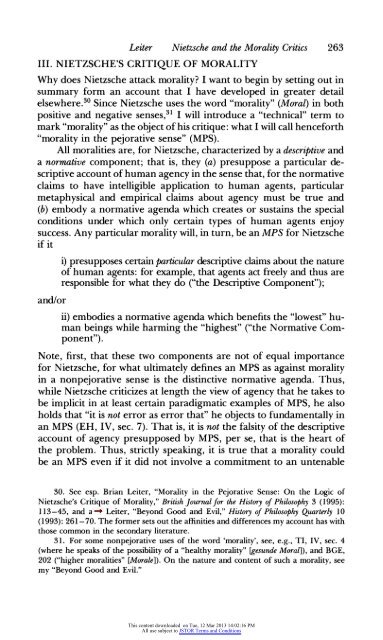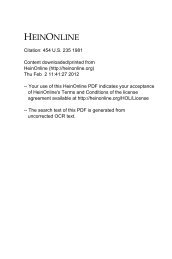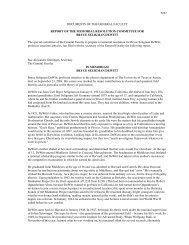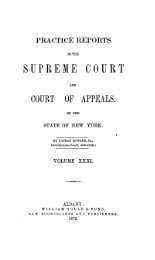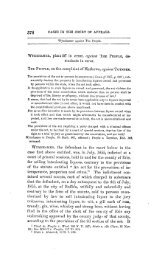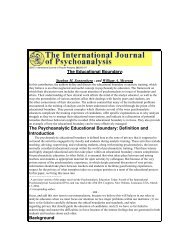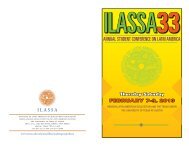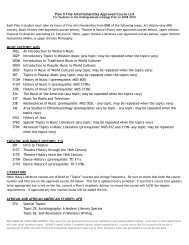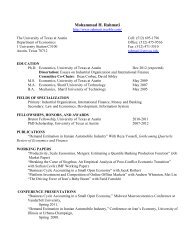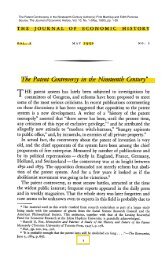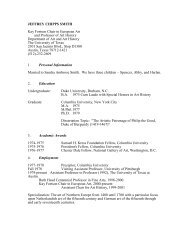Nietzsche and the Morality Critics - The University of Texas at Austin
Nietzsche and the Morality Critics - The University of Texas at Austin
Nietzsche and the Morality Critics - The University of Texas at Austin
Create successful ePaper yourself
Turn your PDF publications into a flip-book with our unique Google optimized e-Paper software.
Leiter <strong>Nietzsche</strong> <strong>and</strong> <strong>the</strong> <strong>Morality</strong> <strong>Critics</strong> 263III. NIETZSCHE'S CRITIQUE OF MORALITYWhy does <strong>Nietzsche</strong> <strong>at</strong>tack morality? I want to begin by setting out insummary form an account th<strong>at</strong> I have developed in gre<strong>at</strong>er detailelsewhere.30 Since <strong>Nietzsche</strong> uses <strong>the</strong> word "morality" (Moral) in bothpositive <strong>and</strong> neg<strong>at</strong>ive senses,31 I will introduce a "technical" term tomark "morality" as <strong>the</strong> object <strong>of</strong> his critique: wh<strong>at</strong> I will call henceforth"morality in <strong>the</strong> pejor<strong>at</strong>ive sense" (MPS).All moralities are, for <strong>Nietzsche</strong>, characterized by a descriptive <strong>and</strong>a norm<strong>at</strong>ive component; th<strong>at</strong> is, <strong>the</strong>y (a) presuppose a particular descriptiveaccount <strong>of</strong> human agency in <strong>the</strong> sense th<strong>at</strong>, for <strong>the</strong> norm<strong>at</strong>iveclaims to have intelligible applic<strong>at</strong>ion to human agents, particularmetaphysical <strong>and</strong> empirical claims about agency must be true <strong>and</strong>(b) embody a norm<strong>at</strong>ive agenda which cre<strong>at</strong>es or sustains <strong>the</strong> specialconditions under which only certain types <strong>of</strong> human agents enjoysuccess. Any particular morality will, in turn, be an MPS for <strong>Nietzsche</strong>if it<strong>and</strong>/ori) presupposes certain particular descriptive claims about <strong>the</strong> n<strong>at</strong>ure<strong>of</strong> human agents: for example, th<strong>at</strong> agents act freely <strong>and</strong> thus areresponsible for wh<strong>at</strong> <strong>the</strong>y do ("<strong>the</strong> Descriptive Component");ii) embodies a norm<strong>at</strong>ive agenda which benefits <strong>the</strong> "lowest" humanbeings while harming <strong>the</strong> "highest" ("<strong>the</strong> Norm<strong>at</strong>ive Component").Note, first, th<strong>at</strong> <strong>the</strong>se two components are not <strong>of</strong> equal importancefor <strong>Nietzsche</strong>, for wh<strong>at</strong> ultim<strong>at</strong>ely defines an MPS as against moralityin a nonpejor<strong>at</strong>ive sense is <strong>the</strong> distinctive norm<strong>at</strong>ive agenda. Thus,while <strong>Nietzsche</strong> criticizes <strong>at</strong> length <strong>the</strong> view <strong>of</strong> agency th<strong>at</strong> he takes tobe implicit in <strong>at</strong> least certain paradigm<strong>at</strong>ic examples <strong>of</strong> MPS, he alsoholds th<strong>at</strong> "it is not error as error th<strong>at</strong>" he objects to fundamentally inan MPS (EH, IV, sec. 7). Th<strong>at</strong> is, it is not <strong>the</strong> falsity <strong>of</strong> <strong>the</strong> descriptiveaccount <strong>of</strong> agency presupposed by MPS, per se, th<strong>at</strong> is <strong>the</strong> heart <strong>of</strong><strong>the</strong> problem. Thus, strictly speaking, it is true th<strong>at</strong> a morality couldbe an MPS even if it did not involve a commitment to an untenable30. See esp. Brian Leiter, "<strong>Morality</strong> in <strong>the</strong> Pejor<strong>at</strong>ive Sense: On <strong>the</strong> Logic <strong>of</strong><strong>Nietzsche</strong>'s Critique <strong>of</strong> <strong>Morality</strong>," British Journal for <strong>the</strong> History <strong>of</strong> Philosophy 3 (1995):113-45, <strong>and</strong> also Leiter, "Beyond Good <strong>and</strong> Evil," History <strong>of</strong> Philosophy Quarterly 10(1993): 261-70. <strong>The</strong> former sets out <strong>the</strong> affinities <strong>and</strong> differences my account has withthose common in <strong>the</strong> secondary liter<strong>at</strong>ure.31. For some nonpejor<strong>at</strong>ive uses <strong>of</strong> <strong>the</strong> word 'morality', see, e.g., TI, IV, sec. 4(where he speaks <strong>of</strong> <strong>the</strong> possibility <strong>of</strong> a "healthy morality" [gesunde Moral]), <strong>and</strong> BGE,202 ("higher moralities" [Morale]). On <strong>the</strong> n<strong>at</strong>ure <strong>and</strong> content <strong>of</strong> such a morality, seemy "Beyond Good <strong>and</strong> Evil."This content downloaded on Tue, 12 Mar 2013 14:02:16 PMAll use subject to JSTOR Terms <strong>and</strong> Conditions


